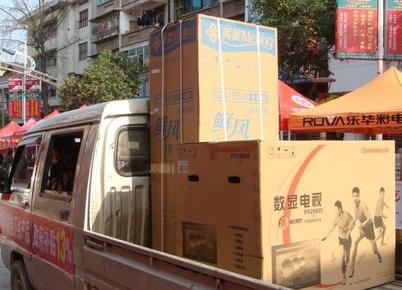 Over the years, the rural household appliances market has been dominated by individual shops in townships and towns due to small consumption and decentralization, consumption habits, and regional cultural differences. Whether it is Suning, Gome and other national chains, or Wuhan Industrial Trade, Yangzhou Huiyin and other regional chains, are unable to reach out to the township directly on the tentacles, mostly in the form of joining or wholesale and town husband and wife wife shop cooperation.
Over the years, the rural household appliances market has been dominated by individual shops in townships and towns due to small consumption and decentralization, consumption habits, and regional cultural differences. Whether it is Suning, Gome and other national chains, or Wuhan Industrial Trade, Yangzhou Huiyin and other regional chains, are unable to reach out to the township directly on the tentacles, mostly in the form of joining or wholesale and town husband and wife wife shop cooperation. Home appliances channel researcher Duanmu Qingyan believes that national, market-wide, regional coverage of home appliance chain giants may not appear, the next three or four markets are likely to appear 1-2 or even more cross-regional home appliance chain companies.
With the acceleration of urbanization, the original channels of rural household appliances began to suffer. In particular, with the changes in rural transportation, living environment, and consumption habits, the obstacles of Gome, Suning, and regional home appliance chaining began to be cleared. Duanmu Qingyan believes: "No scale has no benefit, no chain has no efficiency. The living space of couples on traditional rural markets may be getting smaller and smaller."
So how will rural home appliance channels change in the future? “The nationwide direct home appliance chain model in the primary, secondary, and tertiary markets is unlikely to replicate directly in the fourth-tier rural market. Regional chain franchises, joint ventures, and direct-operated hybrid chains should emerge. Duanmu Qingyan believes that cross-regional platforms, such as Sunshun, Yangzhou Huiyin, and other voluntary franchises, especially Suning, will use the county's flagship stores and wealthy township chain stores as the strategic focus of the township market. .
The risk of multiple parties has started since the second half of 2012, and Dragon Appliances has turned into a multi-party electrical appliance. According to the company’s chairman Wang Huanjiang, more than 8,000 township franchise stores have been integrated, covering basically all provinces and cities across the country.
For the multi-party business model of “mainly for franchising, intended to integrate rural channels across the countryâ€, home appliance chain companies from Jiangsu, Jiangxi, and Zhejiang were generally “not optimistic and hype when interviewed by reporters from China Enterprise Newsâ€. Suspected."
An electric chain person in Jiangxi pointed out that now the development of rural home appliance chains is the quickest way to join, but they are facing the problem that they cannot be locked. Many rural bosses have limited visions and patterns. They only look at the immediate interests and often appear as chaos. If you just hang a shop, but can not form a long-term business cooperation, this is a concept hype.
At present, many parties are in urgent need of hand-joining networks as a bargaining chip to negotiate with the upper reaches of home appliance brands in an effort to purchase preferential resources such as purchase prices and promotions. But for township franchise owners, only to care about whether they can always make money. Once the continued profitability of franchise stores cannot be guaranteed, the turnover rate of these channels will be high, and eventually the products of upstream manufacturers will become inventory burden.
An electric chain person in Zhejiang pointed out: “The key to the development of rural home appliance chains is not to establish a nationwide network. The key lies in how to make the franchisee’s 'big belly' (product pressure goods)’ and “small bellyâ€. "Product promotion"', the key is to provide a continuous promotional service system, let them see you follow your head. Not crediting and other small favors can win trust."
Rural channels have not yet reached the chain of multiple parties and there will undoubtedly be conflicts in the current and third-tier market channels for household appliance companies. According to Hong Shibin, a commentator for the Sankei Economy, the commercial layout of first and second-tier companies in the rural market is relatively complete. In the short term, they will not give up their business partners because of cooperation with Dafangda. For the third and fourth-tier companies, the logistics distribution and after-sales service in the rural market are completely blank as the sales network. These burdens will be passed on to many parties.
"As an example, the company's own daily refrigerators and ice bear refrigerators are limited to the second- and third-tier markets in terms of their cooperation with merchants in terms of logistics and distribution. The demand for delivery of more than 8,000 township stores with small demand? Faced with the existing product after-sales service, how will multi-site reach rapid response? If there is an empty sales network and there are two major networks of logistics distribution and after-sales service, the Obviously it will fall into the dilemma of being 'unsupportable'," said a person from a chain company in Jiangsu.
Siping household appliances planning department official Yan Hongbing said that in recent years, rural household appliances market has shown a highly centralized branding pattern, air conditioning is the United States Gree, refrigerator is Haier Rongsheng Meiling, color TV is the top five brands, washing machine is Haier Little Swan. This is obviously not good news for the multi-party chain that can only integrate large companies' weak products and SME products.
Communication Cable,Screen Communication Cable,Pair Cable,Intrinsic Safety Cable
Baosheng Science&Technology Innovation Co.,Ltd , https://www.bscables.com